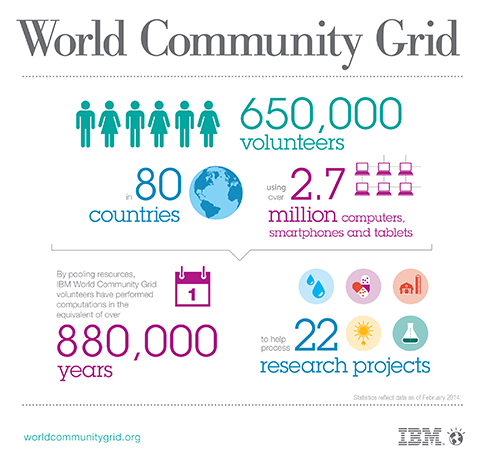Years ago, I joined the World Community Grid to spare processing cycles on my computer to fight disease, global warming and other challenges that need MASSIVE COMPUTING POWER!
Join Now!
It costs you nothing, and you have the fun of occasionally finding out about projects that you've been working on ... or at least your lap top has been.
World Community Grid enables anyone with a computer, smartphone or tablet to donate their unused computing power to advance cutting-edge scientific research on topics related to health, poverty and sustainability. Through the contributions of over 650,000 individuals and 460 organizations, World Community Grid has supported 24 research projects to date, including searches for more effective treatments for cancer, HIV/AIDS and neglected tropical diseases. Other projects are looking for low-cost water filtration systems and new materials for capturing solar energy efficiently
World Community Grid research partners have published over 35 peer-reviewed papers in scientific journals and have completed the equivalent of hundreds of thousands of years of research in less than a decade. World Community Grid is the biggest volunteer computing initiative devoted to humanitarian science, and is as powerful as some of the world's fastest supercomputers.
You simply install an application and let the good work begin. When not using its full capacity, your computer, smartphone or mobile device connects to World Community Grid. The software is unobtrusive and has no impact on your day-to-day use of the device. Once onboard, you're a crucial part of a giant global network. You have the opportunity to learn about groundbreaking scientific studies and stay engaged with the world-changing issues you're helping to solve.
Learn More-->
Driving fast, sustainable change
World Community Grid is the biggest virtual supercomputer being used for humanitarian research. Since it began, over 600,000 volunteers have helped scientists to complete thousands of years' work in a few short years.
Try It!

No comments:
Post a Comment